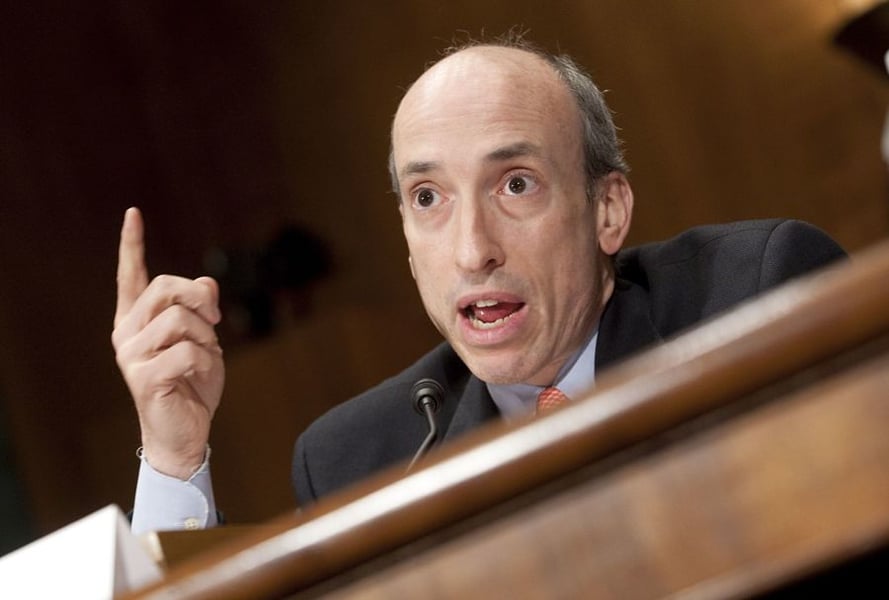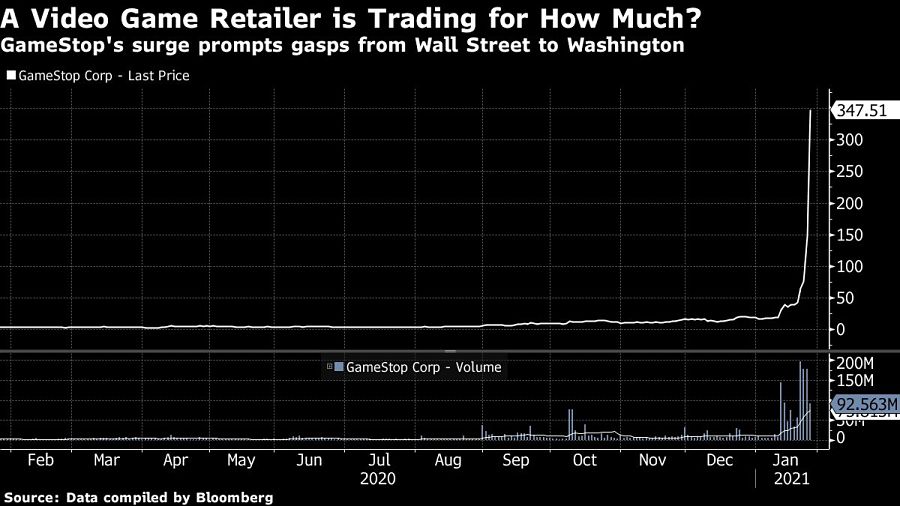

From the mania engulfing GameStop Corp. and penny stocks to the explosive growth of SPACs, a nervous question is starting to make the rounds within American finance: Will the next sheriff of Wall Street be able to tame these wild markets?
Gary Gensler, President Joe Biden’s pick to lead the Securities and Exchange Commission, is poised to confront a run-up in share prices with few parallels in modern history. Perhaps more worrisome, the astronomical valuations are tied to companies like GameStop that aren’t expected to turn a profit for years, or, in the case of special-purpose acquisition companies, stocks with no actual business behind them.
The looming threat for Gensler, 63, is that the good times could end on his watch, triggering a crash that hits retail investors who’ve contributed to the boom particularly hard. That wouldn’t just create a big problem for the incoming SEC chief, but also for Federal Reserve Chairman Jerome Powell, Treasury Secretary Janet Yellen and the Biden administration.
“We’re in a bubble, and bubbles burst,” said Jill Fisch, a professor at the University of Pennsylvania’s law school who focuses on market regulation. “For the SEC, that’s a tough thing because investors lose a lot of money. The question is how do you regulate when you know there’s a bubble?”
Speculative furor has been building in stocks for the better part of a year, fueled by the Fed’s easy-money policies and an army of first-time traders who’ve embraced commission-free brokerage apps like Robinhood’s while stuck at home during the coronavirus pandemic. After bottoming last March, the S&P 500 has soared almost 70%, pushing measures of valuations based on profits and sales to the highest since the dot-com era.

The frenzy has gotten particularly wild this week, stirring anxieties in Washington. In a Wednesday statement, the SEC said it’s actively monitoring volatility in options and equity markets, and working with other regulators to assess the situation. Yellen and Biden’s economic team are also keeping a close eye on the trading of companies whose stock prices have soared in recent days, according to White House Press Secretary Jen Psaki.
Meanwhile, Sen. Elizabeth Warren demanded that the SEC and other watchdogs “do their jobs.” In a statement, the Massachusetts Democrat also took pleasure from the fact that hedge funds that shorted video game retailer GameStop had been hammered. Rep. Alexandria Ocasio-Cortez, D-N.Y., concurred, calling out “Wall Streeters” in a tweet that admonished them for complaining about small-time investors banding together to post bullish comments about stocks on online message boards.
Gensler, who didn’t respond to a request for comment, is expected to take a much harder line at the SEC than market watchdogs did in the Trump era. He frequently sparred with finance executives when he imposed aggressive new rules on swaps trading while leading the Commodity Futures Trading Commission during the Obama administration. While the drawn-out process of issuing new regulations is an often less than ideal way to respond to fast-moving markets, there are several tools at his disposal.
They include using the bully pulpit to call out conduct the SEC doesn’t like and threatening enforcement actions. In the case of SPACs, which are also known as blank-check companies, Gensler could temper some of euphoria by slow-walking new deals. And he might push brokers to do a better job in disclosing the dangers tied to stock options and margin accounts that retail investors have used to supersize their bets -- or their losses.
Still, there are arguments to be made that Gensler should tread carefully. Equities -- along with housing -- are considered one of the few bright spots at a time when the U.S. economy is being ravaged by COVID-19. Plus, he wouldn’t want to announce any moves that trigger a sell-off in stocks, thus causing losses for the mom-and-pop investors that the SEC is focused on protecting.
Gensler’s plans for navigating this terrain will be front-and-center in the coming weeks when the Senate considers his nomination. While hearings before the Senate Banking Committee haven’t yet been scheduled, he’s all but assured to be grilled about traders teaming up on Reddit to drive stocks higher, whether the SPAC boom will end badly and if online trading platforms are prompting naive investors to take risks that they don’t understand.
SPACs are among the investment crazes that have been particularly lucrative for Wall Street, as the offerings are underwritten by banks and often started by hedge fund managers and private-equity firms. They attracted a record $80 billion last year, with everyone from billionaire investor Bill Ackman to basketball legend Shaquille O’Neal getting in on the action.
SPACs raise money by selling shares and the proceeds are eventually used to acquire a company, so investors are ostensibly wagering on the sponsor’s ability to pull off a good deal. In the meantime, they operate as corporate shells that trade on exchanges with no profits or revenue.
John Britt, a retired SEC lawyer who reviewed SPACs for the agency in the 1980s and 1990s when they were called blind pools, said many of the deals that regulators evaluated in his time were garbage and bad for shareholders over the long term. To protect investors, some of the SEC staff adopted an informal approach of asking lots of tough questions that they hoped sponsors couldn’t answer, prompting them to ultimately give up and go away. Gensler’s SEC might want to bring back that approach, he noted.
“It’s groundhog day in the investment world,” Britt said. “They were bad news then and they are bad news now. They should just ban them.”
One of the most powerful ways for any SEC chairman to discourage unwanted behavior is making speeches and issuing public statements.
Gensler’s predecessor, Jay Clayton, frequently spoke out about what he believed were widespread abuses involving cryptocurrencies, prompting market participants to pull back from some of their excesses. Clayton also triggered a brief slump for shares of SPACs in September when he announced that the SEC was scrutinizing the industry due to concerns that shareholders weren’t being told enough about how much money insiders could earn from the offerings.
Gensler could have a similar impact by saying the SEC is examining online posts for signs of collusion or stating that the agency’s enforcement division has launched investigations into whether traders are utilizing social media to manipulate markets -- such as coordinating efforts to drive up certain stocks before dumping them.
“I expect that Gensler will stick to the usual role of sounding like a stern parent and will not seek special rules to chill the market,” said Columbia Law School professor John Coffee.

Relationships are key to our business but advisors are often slow to engage in specific activities designed to foster them.

Whichever path you go down, act now while you're still in control.

Pro-bitcoin professionals, however, say the cryptocurrency has ushered in change.

“LPL has evolved significantly over the last decade and still wants to scale up,” says one industry executive.

Survey findings from the Nationwide Retirement Institute offers pearls of planning wisdom from 60- to 65-year-olds, as well as insights into concerns.
Streamline your outreach with Aidentified's AI-driven solutions
This season’s market volatility: Positioning for rate relief, income growth and the AI rebound
